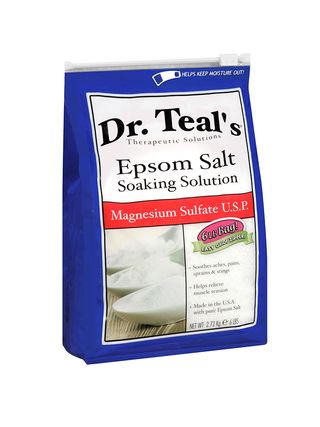8 Signs Your Magnesium Levels Are Too Low

Has your "supplement shelfie" become a touch crowded of late? Sorry to break it to you, but it might be time to make room for one more: magnesium.
Wellness lovers love turning to supplements to balance out dietary deficiencies with vitamins, herbs, compounds, and more — and no one knows this better than Kelly McCann, MD. The owner and founder of The Spring Center in Costa Mesa, California, McCann heads a mecca for functional and integrative medicine. With degrees in Western medicine as well as naturopathy, her holistic understanding of the oft-overlooked mineral has us convinced its worth adding to your lineup.
Our expert explained that magnesium is needed for a hundreds biological processes, from muscle and nerve function, to energy production, to blood pressure regulation, and the list goes on. Ideally, we would be able to rely on our food sources to provide us with the mineral, but the modern food supply unfortunately lets us down. "Most processed foods and non-organic foods contain very little magnesium," she corroborates. Combining the high biological demand with its limited natural sources, upping your magnesium intake with a supplement could be a good idea.
To find out whether a magnesium supplement belongs in your future, read on to learn about the eight signs that your magnesium levels are low… and what to do about it.
The statistics
"Nearly everyone can benefit from a magnesium supplement as 75% of the population is deficient," McCann explains. "Magnesium is required in over 300 different metabolic processes in the body, [making it] easy to become deficient."
You smoke, drink, or take certain medications.
Certain lifestyle choices can limit your supply by compromising your body's absorptive abilities. "Smoking, [drinking] alcohol, and many medications have been shown to interfere with magnesium absorption," McCann explains.
You're anxious or depressed.
"Both anxiety and depression are associated with low magnesium," McCann shares. "Mg is needed for [the] conversion of tryptophan to serotonin, and has been shown to be helpful to prevent depression and support treatment."
(FYI: Serotonin is the calm and happy neurotransmitter targeted by many antidepressants. Low levels are associated with both depression and anxiety.)
You're constipated.
Remember that wellness and bowel movements tend to go hand-in-hand, so if you aren't quite "regular," there could be cause for concern. Think of it this way: Every time we detox, we retox. Regular elimination is an important form of detoxing; if you aren't going number two at least once a day, something should be done. Magnesium can be helpful, as it's associated with softening stool.
You suffer from headaches or migraines.

One of the worst parts about migraines is how difficult they are to treat. As McCann reveals, magnesium might offer sweet relief: "Both oral and IV magnesium can reduce and even stop a migraine."
You deal with muscle aches, weakness, or cramps.
"Magnesium deficiency may also manifest as muscle aches, weakness or muscle twitches, and muscle cramps," she shares.
You have sleep problems.

Even your insomnia can benefit from upping your levels. "Magnesium has been shown to improve every sleep parameter and reduce restless legs," she states.
You have asthma.
Asthma attacks are terrifying, even when you have an inhaler within reach. According to McCann, tending to your magnesium levels can help: "Magnesium inadequacy increases asthma and bronchospasms."
The fact is that our bodies' need for magnesium isn't going anywhere, while the natural sources of magnesium are becoming more scarce. The case for taking a magnesium supplement is strong, with a long list of physical ailments that can stem from low magnesium levels. Evidence shows low magnesium levels are linked to all sorts of serious health outcomes, including heart health, bone mineralization, diabetes, and PMS—in addition to the symptoms above.
If any of these wellness woes speak to you, McCann recommends choosing an oral supplement and taking it at nighttime before bed. Be sure to choose a highly bioavailable form of the mineral to ensure its efficacy — Magnesium chloride, lactate, and aspartate are three of McCann's picks. Even if you're unable to tolerate an oral pill, topical options exist. Epsom bath salts, magnesium oils, and body lotions can all help give your mineral levels a boost.
Shop some of our picks below.

This spray-on oil boasts nearly 1500 positive reviews on Amazon, many of which note its calming effect on sore muscles and a stressed-out mind. Apply it before bed for some top-notch z's.

Pro tip: Reserve this bath soak for days when stress levels are 11/10.

As McCann mentioned, magnesium lactate is one of the superior varieties for maximum absorption. Bonus: These capsules are vegetarian.Next up: Experts break down all the benefits of probiotics.
Disclaimer
This article is provided for informational purposes only and is not intended to be used in the place of advice of your physician or other medical professionals. You should always consult with your doctor or healthcare provider first with any health-related questions.
-
 This Beauty Blogger's Wind-Down Routine Is Anything But a Snooze
This Beauty Blogger's Wind-Down Routine Is Anything But a SnoozeSee her go-to workout and her favorite vitamins.
By Virginia Yapp
-
 13 Products That Will Step Up Your Self-Care Game From Home
13 Products That Will Step Up Your Self-Care Game From HomeGet that glow from within.
By Natalie Gray Herder
-
 I Only Ate Sakara Life Meals for 30 Days—Here Are 7 Things That Happened
I Only Ate Sakara Life Meals for 30 Days—Here Are 7 Things That HappenedThe brand's 30-Day Fall Reset is finally here.
By Erin Jahns
-
 Don't Forget This Vital Ingredient When It Comes to Gut Health
Don't Forget This Vital Ingredient When It Comes to Gut HealthIt's crucial.
By Sarah Yang
-
 The 6 Warning Signs You're Not Getting Enough Protein
The 6 Warning Signs You're Not Getting Enough ProteinAnd what to eat to up your intake.
By Sarah Yang
-
 Everything This Professional Ballet Dancer Eats to Fuel Her For Performances
Everything This Professional Ballet Dancer Eats to Fuel Her For PerformancesHer grocery staples include high-quality French butter.
By Candice Aman
-
 These 8 Foods Are the Worst for Rosacea—Here's What to Eat Instead
These 8 Foods Are the Worst for Rosacea—Here's What to Eat InsteadControl those flare-ups.
By Sarah Yang
-
 FYI: This Vitamin Affects Your Skin, Immune System, and Eye Health
FYI: This Vitamin Affects Your Skin, Immune System, and Eye HealthIt's a big deal.
By Sarah Yang

